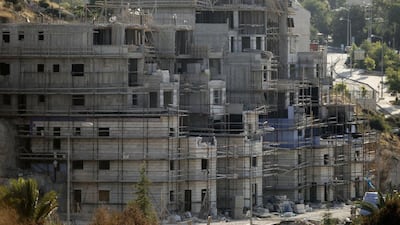During this month’s Jewish holiday of Tisha B’Av, commemorating various disasters in Jewish history, thousands of Israelis marched along the walls of the Old City in Jerusalem and called for annexation of the occupied West Bank. Pro-settlement group Women in Green, founded in 1993 and “dedicated to safeguarding our God-given Biblical homeland”, spoke at the rally. Co-founder Yehudit Katsover told the Israeli government to build more settlements and claimed this wasn’t happening “because we’re afraid of pressure from the dwarf Obama … we don’t impose sovereignty because we fear the demographics”.
Other speakers, including Dov Kalmanovich, the deputy mayor of Jerusalem, demanded countless more colonies across the West Bank. Former member of parliament Aryeh Eldad, who lives in an illegal settlement himself, told an cheering crowd that, “this curse of Palestine has been chasing us to this day. We must erase the name Palestine from Eretz Israel”.
A prominent member of the Israeli Knesset, Yehuda Glick, said: “We must make clear that all the talk about the chance for a Palestinian state is finished … we will proceed in imposing Israeli sovereignty in Judea and Samaria [the West Bank], and anyone wishing to live in peace is welcome, and if they don’t we’ll use harsh measures against them.”
It’s easy to dismiss such comments as emerging from a far-right Zionist fringe, disconnected from the Israeli population. Some Israelis would certainly oppose these ideas as antithetical to peace with the Jewish state’s Palestinian neighbours and population. But the Israeli mainstream has moved sharply to the right in the last decade. A poll conducted by the Peace Index from the Israeli Democracy Institute this year found that 72 per cent of Jewish Israelis did not consider Israeli control over Palestinians as “occupation”.
This profound state of denial is ubiquitous within Israeli society and its largely docile media. Life in the West Bank for Palestinians, let alone Gaza, is rarely examined in the press except in the context of how it impacts the ability of the Israeli Defence Forces to operate with impunity.
Next year is the 50th anniversary of Israel’s control of the West Bank and Gaza. Today there are more than 400,000 Jewish settlers squatting illegally in the West Bank, with at least 200,000 more in East Jerusalem.
Oxford University scholar Sara Yael Hirschhorn released figures in 2015 that showed about 15 per cent of West Bank settlers, roughly 60,000 people, were American citizens. Dr Hirschhorn told a conference in Jerusalem last year that these people were “young, idealistic, intelligent and seasoned liberal Americans who were Zionist activists, and who were eager to apply their values and experiences to the Israeli settler movement”.
If the majority of Israelis don’t view their policies over the Palestinians as discriminatory and regard it as normal to control countless aspects of daily Palestinian life – from house demolitions to random checkpoints and arresting children in the middle of the night to expropriating Palestinian land for ever-expanding Israeli settlements – it’s important to understand how and why this narrative became so accepted. Israel’s settler movement has operated over five decades with strategic brilliance, occupying senior positions in all levels of the government and military.
I recently travelled around the West Bank, spending time with Israeli settlers and sleeping in their homes. I wanted to understand their world view, from the religious fanatics to the pragmatic occupier who craved cheaper housing (property is far less expensive in the West Bank than in Israel proper). The mood was mostly defiant, nobody feared being evacuated any time soon, if ever, and yet insecurity and arrogance permeated many of my conversations. Some feared an unlikely coalition of local and global journalists, leftists, politicians and NGOs forcing Israel to concede territory and divide the land. To anybody who spends a few hours travelling around the West Bank, however, it is clear that a just two-state solution is no longer possible.
Orthodox Jew Yair Ben-David lives with his family at Kashuela Farms near Gush Etzion settlement. Surrounded by sheep and goats, he told me that“Palestinians know that Israel is the best place to live.
“It’s better than life under Hamas or the Palestinian Authority. Be good and you will get a good situation as a Palestinian.”
Like virtually every settler I met, Mr Ben-David tolerated Palestinians living in a Jewish state but they had to be subservient to Jewish rule.
With such facts on the ground, it seems almost unimaginable that Israel’s occupation will not last for the foreseeable future. There are no serious forces pushing against it (though the boycott, divestment and sanctions movement is growing in global strength).
But never-ending colonisation presents practical and moral questions: how to manage millions of disaffected Palestinians? Ethnically cleansing them to neighbouring states is logistically challenging (let alone ethically abhorrent) and yet I’ve long wondered if western and Arab powers would really care apart from issuing stern statements of opposition. They’ve spent decades doing little else.
Israel finds itself in a unique position. Situated in a region where nations are convulsing and disintegrating, the Jewish state advertises itself as an island of stability. Occupation barely bothers any Israelis enough to do anything concrete about it and the Israeli government is packed with politicians who crave annexing the entire West Bank.
In this scenario, Palestinians are trapped between their own corrupt leaders and Israeli intransigence. A third intifada is inevitable.
Antony Loewenstein is an independent journalist in Jerusalem and author of Disaster Capitalism: Making a Killing Out of Catastrophe

